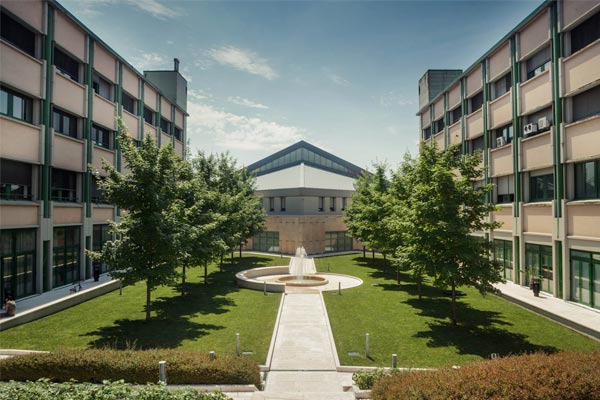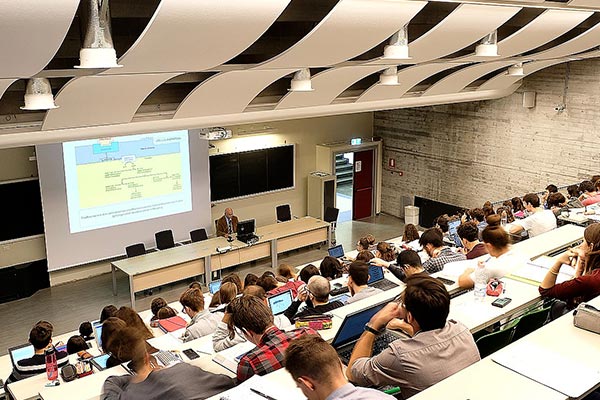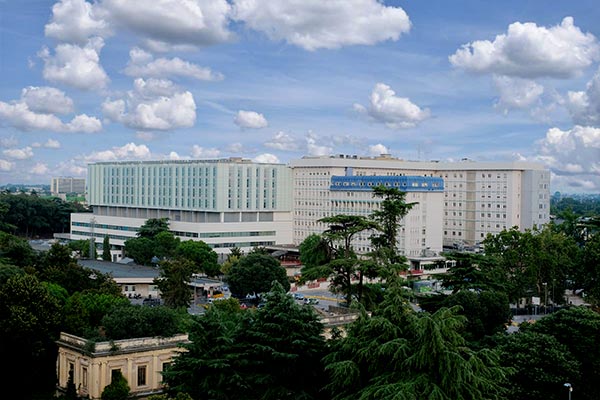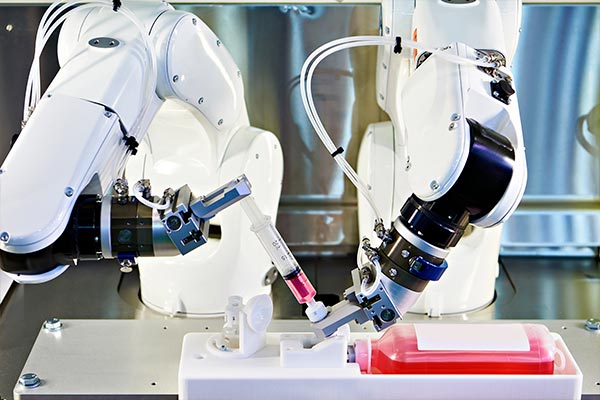|
Laurea magistrale in Computer Engineering for intelligent Systems
|
Computer architectures and programming for intelligent systems (2025/2026)
|
6
|

|
2
|
(Laboratorio)
|
|
4
|
(Teoria)
|
|
Laurea magistrale a ciclo unico in Medicina e Chirurgia ad indirizzo tecnologico
|
Genetica (2025/2026)
|
6
|

|
1
|
TIROCINIO DI RICERCA [Laboratorio PARCO - Gruppo Prof. Bombieri]
|
|
Laurea interateneo in Ingegneria dei sistemi medicali per la persona
|
Linguaggi e strumenti di programmazione con laboratorio (2025/2026)
|
12
|

|
8
|
(Teoria)
|
|
Dottorato in Ingegneria dei Sistemi Intelligenti
|
Modellazione e verifica di sistemi digitali (part III) (2025/2026)
|
0,5
|
|
0,5
|
|
|
Laurea magistrale in Medical bioinformatics [LM-18]
Corso a esaurimento
|
Parallel programming (2025/2026)
|
6
|
|
1
|
(Part 2 - lab)
|
|
2
|
(Part 2 - theory)
|
|
1
|
(Part 1 - lab)
|
|
2
|
(Part 1 - theory)
|
|
Laurea magistrale in Computer Engineering for Intelligent Systems [LM-32]
Corso a esaurimento
|
Computer architectures and programming for intelligent systems (2024/2025)
|
6
|

|
6
|
|
|
Laurea interateneo in Ingegneria dei sistemi medicali per la persona [L-8]
Corso a esaurimento
|
Linguaggi e strumenti di programmazione con laboratorio (2024/2025)
|
12
|

|
8
|
(Teoria)
|
|
Dottorato in Ingegneria dei Sistemi Intelligenti
|
Modellazione e verifica di sistemi digitali (2024/2025)
|
1,5
|
|
0,5
|
|
|
Laurea magistrale in Medical bioinformatics [LM-18]
Corso a esaurimento
|
Parallel programming (2024/2025)
|
6
|

|
3
|
(Part 1)
|
|
3
|
(Part 2)
|
|
Laurea magistrale in Computer Engineering for Robotics and Smart Industry
Corso a esaurimento
|
Advanced computer architectures (2023/2024)
|
6
|

|
3
|
(Parte II)
|
|
3
|
(Parte I)
|
|
Laurea interateneo in Ingegneria dei sistemi medicali per la persona [L-8]
Corso a esaurimento
|
Linguaggi e strumenti di programmazione con laboratorio (2023/2024)
|
12
|

|
8
|
(Teoria)
|
|
Laurea magistrale in Medical bioinformatics [LM-18]
Corso a esaurimento
|
Parallel programming (2023/2024)
|
6
|

|
4
|
(Teoria)
|
|
2
|
(Laboratorio)
|
|
Laurea magistrale in Computer Engineering for Robotics and Smart Industry
Corso a esaurimento
|
Advanced computer architectures (2022/2023)
|
6
|

|
3
|
(Parte I)
|
|
3
|
(Parte II)
|
|
Laurea interateneo in Ingegneria dei sistemi medicali per la persona [L-8]
Corso a esaurimento
|
Linguaggi e strumenti di programmazione con laboratorio (2022/2023)
|
12
|

|
8
|
(Teoria)
|
|
Laurea magistrale in Medical bioinformatics [LM-18]
Corso a esaurimento
|
Parallel programming (2022/2023)
|
6
|

|
2
|
(Laboratorio)
|
|
4
|
(Teoria)
|
|
Laurea magistrale in Computer Engineering for Robotics and Smart Industry
Corso a esaurimento
|
Advanced computer architectures (2021/2022)
|
6
|

|
4
|
(Teoria)
|
|
2
|
(Laboratorio)
|
|
Laurea magistrale in Medical bioinformatics [LM-18]
Corso a esaurimento
|
Architectures and systems for biological data processing (2021/2022)
|
6
|

|
4
|
(Teoria)
|
|
2
|
(Laboratorio)
|
|
Laurea in Informatica [L-31]
Corso a esaurimento
|
Programmazione I [Matricole dispari] (2021/2022)
|
12
|

|
7
|
(Teoria)
|
|
Laurea magistrale in Medical bioinformatics [LM-18]
Corso a esaurimento
|
Architectures and systems for biological data processing (2020/2021)
|
6
|

|
2
|
(Laboratorio)
|
|
4
|
(Teoria)
|
|
Laurea in Informatica [L-31]
Corso a esaurimento
|
Programmazione I [Matricole dispari] (2020/2021)
|
12
|

|
8
|
(Teoria)
|
|
Laurea magistrale in Ingegneria e scienze informatiche [LM-18/32]
Corso a esaurimento
|
Architetture avanzate (2019/2020)
|
6
|

|
2
|
(Laboratorio)
|
|
4
|
(Teoria)
|
|
Laurea in Informatica [L-31]
Corso a esaurimento
|
Programmazione I [Matricole dispari] (2019/2020)
|
12
|

|
8
|
(Teoria)
|
|
Laurea magistrale in Ingegneria e scienze informatiche [LM-18/32]
Corso a esaurimento
|
Architetture avanzate (2018/2019)
|
6
|

|
4
|
(Teoria)
|
|
2
|
(Laboratorio)
|
|
Laurea in Informatica [L-31]
Corso a esaurimento
|
Programmazione I [Matricole pari] (2018/2019)
|
12
|

|
8
|
(Teoria)
|
|
Laurea magistrale in Ingegneria e scienze informatiche [LM-18/32]
Corso a esaurimento
|
Architetture avanzate (2017/2018)
|
6
|

|
6
|
|
|
Laurea in Informatica [L-31]
Corso a esaurimento
|
Programmazione I [Cognomi A-L] (2017/2018)
|
12
|

|
8
|
(Teoria)
|
|
Laurea magistrale in Ingegneria e scienze informatiche [LM-18/32]
Corso a esaurimento
|
Architetture avanzate (2016/2017)
|
6
|

|
6
|
|
|
Laurea in Informatica [L-31]
Corso a esaurimento
|
Programmazione I (2016/2017)
|
12
|

|
8
|
(Teoria)
|
|
Laurea magistrale in Ingegneria e scienze informatiche [LM-18/32]
Corso a esaurimento
|
Architetture avanzate (2015/2016)
|
6
|
|
6
|
|
|
Laurea in Informatica [L-31]
Corso a esaurimento
|
Programmazione I (2015/2016)
|
12
|
|
8
|
(Teoria)
|
|
Laurea in Informatica [L-31]
Corso a esaurimento
|
Architettura degli elaboratori (2014/2015)
|
12
|
|
2
|
[II turno M-Z] (Laboratorio)
|
|
2
|
[I turno A-l] (Laboratorio)
|
|
1
|
(Esercitazioni)
|
|
Laurea magistrale in Ingegneria e scienze informatiche [LM-18/32]
Corso a esaurimento
|
Architetture avanzate (2014/2015)
|
6
|
|
6
|
|
|
TFA A042 - Informatica (II grado)
|
Fondamenti e programmazione (2014/2015)
|
6
|
|
2
|
DIDATTICA
|
|
Laurea in Informatica [L-31]
Corso a esaurimento
|
Programmazione I (2014/2015)
|
12
|
|
8
|
(Teoria)
|
|
Laurea in Informatica [L-31]
Corso a esaurimento
|
Architettura degli elaboratori (2013/2014)
|
12
|
|
1
|
(Esercitazioni)
|
|
2
|
[II turno M-Z] (Laboratorio)
|
|
2
|
[I turno A-l] (Laboratorio)
|
|
Laurea magistrale in Ingegneria e scienze informatiche [LM-18/32]
Corso a esaurimento
|
Architetture avanzate (2013/2014)
|
6
|
|
6
|
|
|
Laurea in Economia Aziendale (Vicenza)
Corso disattivato
|
Conoscenze per l'accesso: informatica di base (2013/2014)
|
|
|
|
|
|
Laurea in Economia Aziendale (Verona)
Corso disattivato
|
Conoscenze per l'accesso: informatica di base (2013/2014)
|
|
|
|
|
|
Laurea in Informatica [L-31]
Corso a esaurimento
|
Architettura degli elaboratori (2012/2013)
|
12
|
|
2
|
[I turno cognomi dalla A alla L] (Laboratorio)
|
|
2
|
[II turno cognomi dalla M alla Z] (Laboratorio)
|
|
1
|
(Esercitazioni)
|
|
Laurea magistrale in Ingegneria e scienze informatiche [LM-18/32]
Corso a esaurimento
|
Architetture avanzate (2012/2013)
|
6
|
|
6
|
|
|
Laurea in Economia Aziendale (Vicenza)
Corso disattivato
|
Conoscenze per l'accesso: informatica di base (2012/2013)
|
|
|
|
|
|
Laurea in Economia Aziendale (Verona)
Corso disattivato
|
Conoscenze per l'accesso: informatica di base (2012/2013)
|
|
|
|
|
|
Laurea in Informatica [L-31]
Corso a esaurimento
|
Architettura degli elaboratori (2011/2012)
|
12
|
|
2
|
[II turno cognomi dalla M alla Z] (Laboratorio)
|
|
2
|
[I turno cognomi dalla A alla L] (Laboratorio)
|
|
1
|
(Esercitazioni)
|
|
Laurea magistrale in Ingegneria e scienze informatiche [LM-18/32]
Corso a esaurimento
|
Architetture avanzate (2011/2012)
|
6
|
|
6
|
|
|
Laurea in Economia Aziendale (Verona)
Corso disattivato
|
Conoscenze per l'accesso: informatica di base (2011/2012)
|
|
|
|
|
|
Laurea in Economia Aziendale (Vicenza)
Corso disattivato
|
Conoscenze per l'accesso: informatica di base (2011/2012)
|
|
|
|
|
|
Laurea in Economia Aziendale (Vicenza)
Corso disattivato
|
Abilità informatiche di base (2010/2011)
|
2
|
|
2
|
|
|
Laurea in Economia Aziendale (Verona)
Corso disattivato
|
Abilità informatiche di base (2010/2011)
|
2
|
|
2
|
|
|
Laurea in Informatica [L-31]
Corso a esaurimento
|
Architettura degli elaboratori (2010/2011)
|
12
|
|
3
|
[I Turno] (Laboratorio)
|
|
3
|
[II Turno] (Laboratorio)
|
|
Laurea magistrale in Ingegneria e scienze informatiche [LM-18/32]
Corso a esaurimento
|
Architetture avanzate (2010/2011)
|
6
|
|
6
|
|
|
Laurea in Economia Aziendale (Verona)
Corso disattivato
|
Abilità informatiche di base (2009/2010)
|
2
|
|
2
|
|
|
Laurea in Informatica [L-31]
Corso a esaurimento
|
Architettura degli elaboratori (2009/2010)
|
12
|
|
3
|
[indirizzo multimediale] (Laboratorio)
|
|
3
|
[indirizzo generale] (Laboratorio)
|
|
Laurea magistrale in Ingegneria e scienze informatiche [LM-18/32]
Corso a esaurimento
|
Architetture avanzate (2009/2010)
|
6
|
|
6
|
|
|
Laurea in Informatica [L-31]
Corso a esaurimento
|
Sistemi operativi (2009/2010)
|
12
|
|
3
|
[indirizzo multimediale] (Laboratorio)
|
|
Laurea in Economia del Commercio internazionale (classe 28) Vicenza (ordinamento fino all'a.a. 2008/09)
|
Abilità informatiche di base (2008/2009)
|
2
|
|
|
|
|
Laurea in Economia aziendale (classe 17) (ordinamento fino all'a.a. 2008/09)
|
Abilità informatiche di base (2008/2009)
|
2
|
|
|
|
|
Laurea in Informatica Multimediale (ordinamento fino all'a.a. 2008/09)
Corso disattivato non visibile
|
Architettura degli elaboratori (2008/2009)
|
10
|
|
2
|
Laboratorio
|
|
Laurea in Informatica (ordinamento fino all'a.a. 2008/09)
Corso disattivato non visibile
|
Architettura degli elaboratori (2008/2009)
|
10
|
|
2
|
Laboratorio
|
|
Laurea in Bioinformatica (ordinamento fino all'a.a. 2008/09)
Corso disattivato non visibile
|
Elementi di sistemi operativi (2008/2009)
|
6
|
|
2
|
Laboratorio
|
|
Laurea in Informatica Multimediale (ordinamento fino all'a.a. 2008/09)
Corso disattivato non visibile
|
Sistemi operativi (2008/2009)
|
10
|
|
4
|
Laboratorio
|
|
Laurea in Informatica Multimediale (ordinamento fino all'a.a. 2008/09)
Corso disattivato non visibile
|
Sistemi operativi (2007/2008)
|
10
|
|
4
|
Laboratorio
|








 bombieri
bombieri univr
univr

